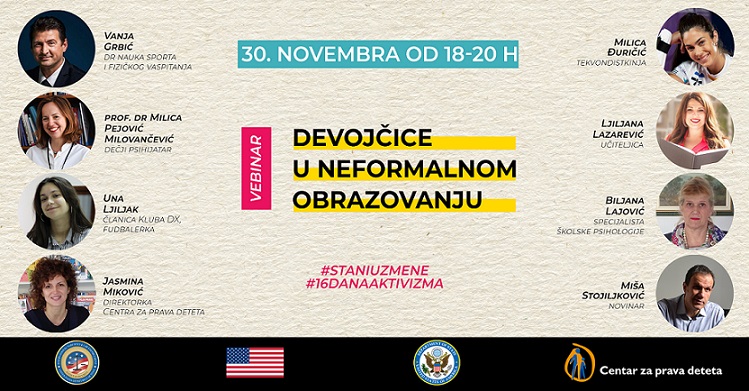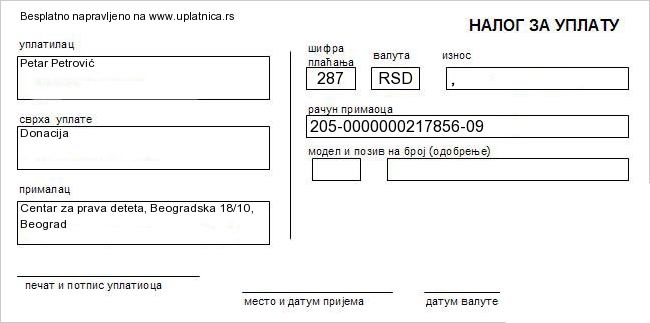
“Inappropriate treatment of a child, in the sense of not recognizing its needs, can lead to problems in the mental health of a child.”, Milica Pejović Milovancević, MD PhD. Child Psychiatrist
On 30 November 2021, Child Rights Centre (CRC) organized a webinar “Girls in Informal Education”, as part of the 16 Days of Activism Against Gender-Based Violence global campaign, with the aim of drawing public attention to the fact that as a society we must always have zero tolerance for gender-based violence against girls. Milica Đuričić, taekwondo player, Milica Pejović Milovancević, MD PhD. Child Psychiatrist, Biljana Lajović, school psychology specialist, Ljiljana Lazarević, teacher, Vanja Grbić, PhD in Physical Education and Sport, Una Ljiljak, member of the DX Club and football player and Jasmina Miković, CRC director, were the panelists while Miša Stojiljković, journalist, was the moderator.
Through the exchange of professional and personal experiences on the impact of informal education on the development of the child’s personality, the panelists were talking about the role of parents, teachers and coaches, as well as the consequences of inappropriate work and improper behavior of adults towards children.
“I was lucky, I grew up in a very good environment, and with a good coach. The most difficult battles are fought with oneself, and that is why it is important to have parents who watch your back, and a coach who accompanies you”, said Milica Đuričić, our most successful taekwondo player and a gold medalist at the Olympic Games.
Teacher Ljiljana Lazarević pointed out that formal education should be a fertile ground for recognizing a child’s talents and affinities, and that is why it is important to educate teachers in formal education to recognize a child’s interest that is outside the content learned at school.
Vanja Grbić, a member of the Hall of Fame and a volleyball Olympic champion, stated, among other things, that support and cooperation of authorities, i.e. parents, teachers and coaches, is important in order to reach a child’s full developmental potential, and if these authorities question each other or the whole relationship is built on the wrong basis, which often happens, then it is not good for the child’s development.
Milica Pejović Milovančević, MD PhD. Child Psychiatrist,pointed out that treating a child is not a personal, but a public matter. Inappropriate treatment of a child has a serious impact not only on that child, but on the development of the whole society. Aggressive punishment is one of the biggest causes of improper behavior of children and can later lead to juvenile delinquency.
Sometimes adults can commit a series of actions that can have a cumulative negative impact on a child. It often happens that adults turn a deaf ear to the indicators of inappropriate treatment and react only when such behaviors escalate.
Biljana Lajović,school psychology specialist, pointed out at certain flaws: “There is no systematic monitoring of the way of working with children in informal education. The reaction occurs only when there is an incident and when the whole country buzzes about it, and it is not known who works with the children and how.”
The lack of appropriate procedures, the lack of a monitoring system for those who work with children, the untimely reaction of the competent authorities resulted in distrust in institutions and the creation of a climate in which it is safest and wisest to remain silent and not interfere.
Seventeen-year-old Una Ljiljak points out: “The problem is that my generation has the attitude “I don’t want to interfere, I don’t care, because if I interfere, I will become part of the problem.” It is understandable because there are consequences and sanctions. I am disappointed that we do not react, because it concerns us. On the other hand, I am proud to be part of a generation that can change the world. “
Participants agreed that informal education is as important as formal and that this topic is important for the whole society, but it seems that there is not enough awareness of how serious this issue is. We must not deal with informal education only upon an incident and when the media report on disturbing events and situations of violence against girls, but it is necessary to regulate the area of child protection in informal education in order to prevent such situations.
First of all, it is necessary to establish a clear legislative framework and connect different systems through a multisectoral approach, introduce standards and procedures in all economic entities (schools, small schools, clubs, studios and other forms of informal work with children), which will ensure a safe, healthy and supportive environment for every girl and every child in Serbia. In addition, it is essential to inform and educate those who work with children in informal education, as well as parents, but also the children themselves, especially girls.
The webinar has been organized as part of the project “Prevention of Violence Against Girls in Informal Education” implemented by the Child Rights Centre with the financial support of the U.S. Department of State’s Bureau of International Narcotics and Law Enforcement Affairs.
